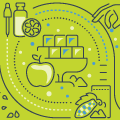
A new Series published in The Lancet, coauthored by Barry Popkin, W.R. Kenan Jr. Distinguished Professor of nutrition at the UNC Gillings Global School of Public Health and founder of the Global Food Research Program at UNC-Chapel Hill, warns that the rapid rise in ultra-processed food (UPF) consumption is undermining diet quality and health globally. The three-paper Series brings together 43 international experts to examine the evidence and […]










